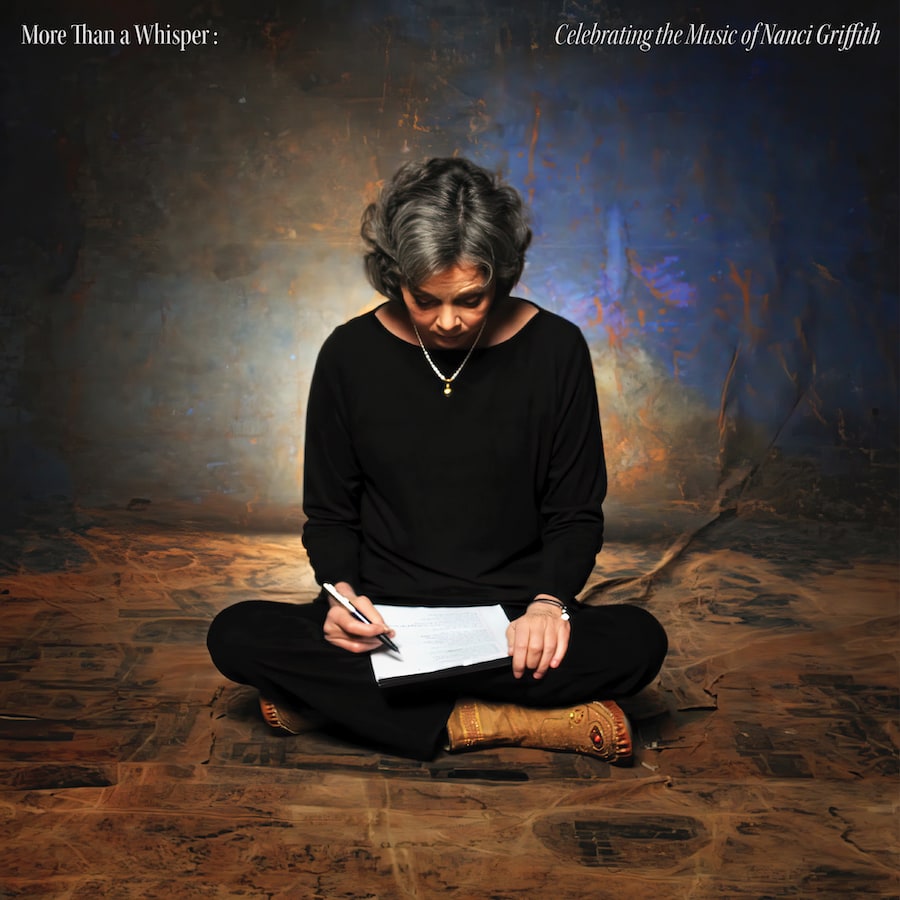
It’s been two years since Nanci Griffith’s untimely passing and, released alongside Working In Corers, a four-CD set of her early out-of-print albums, More Than A Whisper, named for one of her songs and recorded over several years, is a tribute album by a variety of artists who either had a connection with her or whose music shares a kinship.
It begins in a subdued mood with Sarah Jarosz singing You Can’t Go Home Again, a track on her sophomore release, 1982’s Poet In My Window, written in response to the harsh treatment she felt her debut (sadly nothing of which appears here) had received from home-state Texas critics, the wearied vocals capturing the sadness in the lyrics (“This ‘ole town never did really care/That much for me“). Recorded shortly before his passing and previously unreleased, John Prine teams with Kelsey Waldon for a terrific slow walking duet take on Love At The Five and Dime, her bittersweet story of smalltown romance that featured on 1986’s The Last of the True Believers, the fine pedal steel and mandolin provided by Fats Kaplin.
Another collaboration sees bluegrass stars Billy Strings and Molly Tuttle sprightly picking their way through Listen To The Radio (from Storms), the latter on vocals and featuring a guitar solo midway. Country royalty take the baton as Emmylou Harris takes on a solo chug-along, almost Cajun-styled reading of 1988’s Love Wore A Halo (Back Before The War), adopting a spoken delivery in the final stretch. The latter featured on Little Love Affairs, as did Tom Russell co-write Outbound Plane, the line “if love won’t fly on its own/Free will/It’s gonna catch that outbound plane” one of her known refrains and in good hands here with Shawn Colvin who takes it as far slower steady walking pace with a throbbing bass line.
Originally on 1987’s Lone Star State Of Mind and written to celebrate her great-uncle, the only member of her family not to give up his farm after the Great Depression, Lyle Lovett channels Prine as he sings melancholic lead on Trouble In The Fields against Al Perkins’ dobro and Sam Bush’s mandolin and Fiddle accompaniment with Kathy Mattea on harmonies, a similar theme of struggles to keep heads above water being Brady Clarke’s dust country reverb-heavy journey down Gulf Coast Highway that appeared on 1997’s Blue Roses From The Moons.
In 1989, Griffith took a poppier approach with Storms, from which, featuring slide and dobro British duo Ida Mae give a faithful rendition of Radio Fragile, a song written about Phil Ochs, the same album being mined for It’s A Hard Life Wherever You Go, the original’s Celtic sensibilities with the song’s references to Belfast and the Troubles being further enhanced in this interpretation by Steve Earle with Eleanor Whitmore on fiddle and Ivan Goff cranking up the bagpipes to solid effect.
While a relative newcomer in comparison to his fellow contributors, the high-voiced Aaron Lee Tasjan more than earns his place with his take on the title track to 1991’s Late Night Grande Hotel, retaining the piano ballad approach and imbuing it with a quiet soulfulness, Patty Griffin on harmonies, followed by a revving engine introducing Todd Snider’s Southern country stomp through Ford Econoline off Lone Star State of Mind.
Released in 1986 on Philo and leading to her signing to MCA, Last Of The True Believers was Griffith’s fourth album and, given a suitably backwoods gospel feel, Banks Of The Pontchartrain has Iris DeMent outwarbling the original to spine-shivering effect, complemented by Jon Grabof’s pedal steel. Mary Gauthier pens the album’s liner notes, and it’s she who handles duties on the aching fingerpicked guitar and piano title track from that same album, a slower pace and almost a minute longer than the original, with producer Neilson Hubbard on drums, Jaimee Harris on harmonies, Danny Mitchell at the piano, Will Kimbrough on mandolin and a violin solo from Michele Gazich.
It closes with unquestionably Griffith’s best-known song, From A Distance, albeit itself her cover of Julie Gold and the first recording of a number that was subsequently covered by many others, including Judy Collins, Eddi Reader, and, most notably, Bette Midler in 1990 to Grammy-winning effect. Embellished with cello and violin, it’s arguably the album standout. It’s delivered with an inspirational meld of gospel and soul by The War And Treaty, building to anthemic proportions before its quiet, piano-caressed finale. With all proceeds going to benefit Nashville’s Cumberland Heights, a non-profit treatment facility for those affected by drug and alcohol addiction, this is a fine and glowingly affectionate tribute to a much-loved and much-missed singer and songwriter, whose loss will reverberate for years to come.

